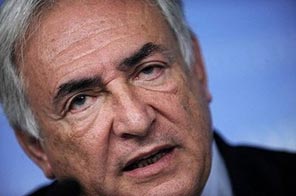IMF unveils newfound strength forged in crisis
ISTANBUL: The International Monetary Fund unveiled newfound strength forged by the global economic crisis on Friday, laying out a plan to even out destabilising imbalances in the world economy.
The IMF, fresh from a stunning endorsement by the Group of 20 largest economies a week ago as the pilot of the world economy, basked in its new mandate in the runup to annual meetings with the World Bank next week in Istanbul.
"This annual meeting may be the starting point of a new IMF, and you may say later when you will be talking with your grandchildren that you were in Istanbul at this time," IMF managing director Dominique Strauss-Kahn said at a news conference.
With the global economy emerging from the worst recession in six decades and expected to grow 3.1 percent next year, Strauss-Kahn said the IMF's role "is now to shape a post-crisis world."
The new role marks a turnabout from two years ago, before the crisis, when the Washington-based institution's credibility and relevance were widely questioned and it cut staff due to tight finances as demand for its loans dried up.
Hailing "unparalled economic cooperation" since the bankruptcy of Wall Street investment bank Lehman Brothers triggered a global financial crisis that hammered growth, Strauss-Kahn said he was worried that consensus might vanish once recovery was in view.
However, the G20 has pushed ahead with a framework plan to build sustainable growth, "with the IMF as the machinery," he said.
Strauss-Kahn said the IMF needed bigger reserves to provide a more stable international monetary system and build its credibility as the lender of last resort.
IMF economists see a big risk that potential post-crisis growth will be lower than it was before the crisis, in part due to a rising savings rate in the United States and an increased consumption in China and other emerging countries, he said.
"In a nutshell, it has to do with the so-called global imbalances," he said.
The IMF chief managing director noted that some countries had built up big reserves after previous crises, which had contributed to the current financial crisis, the worst since the Great Depression.
"There is another solution -- less costly, more efficient -- to avoid this," Strauss-Kahn said. This "is the pooling of reserves, which is the role at the beginning" of the creation of the IMF 65 years ago, he said.
In a speech at an Istanbul hotel, Strauss-Kahn said that official foreign reserves have surged to above eight trillion dollars (5.5 trillion euros) this year from two trillion in the late 1990s and called for more money for the IMF to counter the trend.
"In theory, the IMF should have been able to provide the financial insurance demanded by these countries," he said, according to the text of his speech prepared for delivery.
"However, concerns about the amount of financing available from the fund, and also the conditions attached to this financing, caused countries to self-insure instead."
And despite a massive boost this year in the 186-nation fund's lending capacity to help member countries weather the global economic and financial crisis, the additional support was only temporary.
The 500 billion dollars pledged by the G20 were five-year credits granted to the fund under its New Arrangements to Borrow, a resource the 186-nation fund can use if it believes it lacks the resources to meet members' needs.
The fund's new lending resources "may not be enough to reassure our members and financial markets that they would be sufficient to meet future crises," he said.
"And because providing global financial insurance is so critical for crisis resolution and crisis prevention, the resource base of the IMF should be increased further," he said.
"How much is needed is of course a difficult question -- some have said one trillion dollars, while others think the resource base should be far larger than that."






